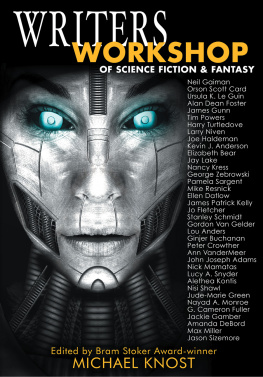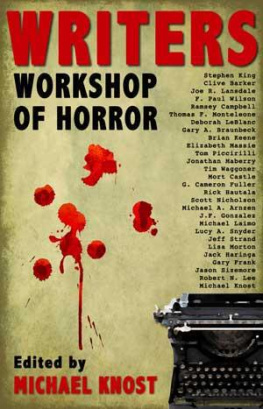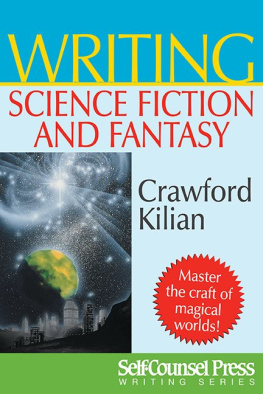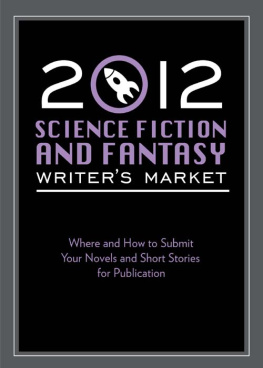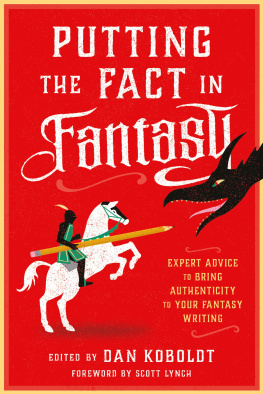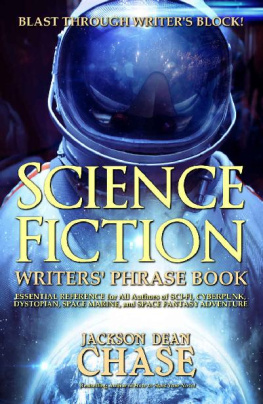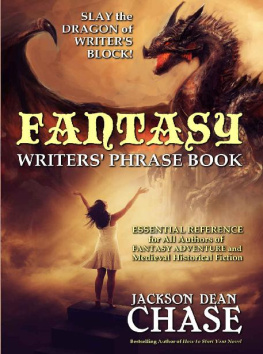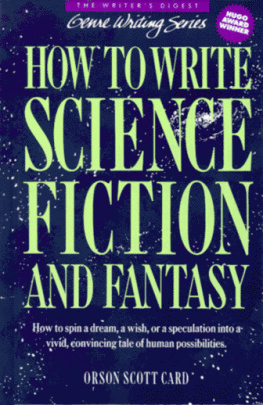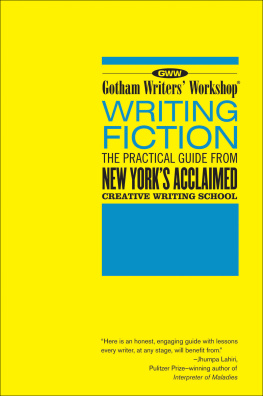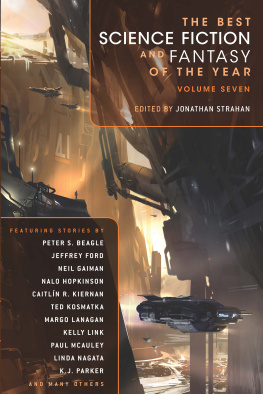Introduction
By Michael Knost
When I put together Writers Workshop of Horror (Woodland Press, 2009) a few years ago, my goal was to produce a writing book I wish would have been available when I began my writing journey. Thats why I included a wide variety of pieces focused on specific elements of the craft by writers I felt excelled in the elements I chose for them. The book became an instant hit and continues to sell quite well.
However, Writers Workshop of Horror did not address dozens of subjects I was still interested in exploring. By confining the project to the horror genre, I restricted myself from a broader scope of elements and ideas. Since I cut my literary teeth on science fiction and fantasy, I decided to move ahead with a similar project in these fields.
I want you to have a clear understating as to what this book is. Writers Workshop of Science Fiction & Fantasy is a collection of essays and interviews by and with many of the movers-and-shakers in the industry. Youre going to find varying perspectives and viewpoints, which is why you may find differing opinions on any particular subject.
This is, after all, a collection of advice from professional storytellers. And no two writers have made it to the stage via the same journeyeach has made his or her own path to success. And thats one of the strengths of this book, I think. The reader is afforded the luxury of discovering various approaches and then is allowed to choose what works best for him or her.
But what about the rules? How can there be different approaches when there are rules to follow? Besides, weve noticed that the big-name writers we love and respect are breaking the rules!
Heres my advice: use the rules until you break them.
I know that sounds like something from an Abbot and Costello routine, but its the truth. Use the rules until you break them.
To be honest, there are only two rules you should never breakthey just so happen to be rules regarding breaking rulesand I made them up, so take them for what theyre worth.
- Never break a rule unless you know you are breaking a rule.
- Always have a reason for breaking a rule.
If you know you are breaking a rule, that simply means you have studied the craft enough to understand its purpose . When you understand the rules purpose, yet have a good reason to ignore it, breaking the rule is possibly the best thing you can do.
Theres a difference in effect between a rule broken out of ignorance and one broken for a reason. For example, Picasso learned to do masterful realistic sketches before venturing into cubism. James Joyce wrote stunning short stories before wandering into Ulysses. Both of these artists mastered their respective craft by paying close attention to the foundational elements. Once they mastered the fundamentals, they were then ready to create art that was unique to their own talents and most celebrated.
I also want to point out that the reader neednt be a writer of science fiction or fantasy to benefit from the advice in these pages. Writing is writing, and the guidance youll find here will be just as solid or sound if you apply it to the romance, western, or thriller genres. However, writers of speculative fiction will obviously glean a greater return because the contributors are masters in the same fields.
One more thing I want to point out. Style and voice may not be the only things you find unique to each writer and/or piece. You will also find structure and other little tidbits that are just as distinctive. The works of British contributors will retain British spelling, grammar, and punctuation. However, I designated a universal structure with the interviews to minimize confusion, yet allowed individual liberties in content.
You should be commended for your interest in learning more about the craft. Because you want your writing to improveit will. Just dont give up.
Dont give up and write every day.
Michael Knost
January 28, 2013
Neil Gaiman
Where Do You Get Your Ideas?
Neil Gaiman writes short fiction, novels, comic books, graphic novels, audio theatre, and films. His notable works include the comic book series The Sandman and novels Stardust , American Gods , Coraline , and The Graveyard Book . Gaimans writing has won numerous awards, including Hugo, Nebula, and Bram Stoker, as well as the 2009 Newbery Medal and 2010 Carnegie Medal in Literature. He is the first author to win both the Newbery and the Carnegie medals for the same work.
Every profession has its pitfalls. Doctors, for example, are always being asked for free medical advice, lawyers are asked for legal information, morticians are told how interesting a profession that must be and then people change the subject fast. And writers are asked where we get our ideas from.
In the beginning, I used to tell people the not very funny answers, the flip ones: From the Idea-of-the-Month Club, Id say, or From a little ideas shop in Bognor Regis, From a dusty old book full of ideas in my basement, or even From Pete Atkins. (The last is slightly esoteric, and may need a little explanation. Pete Atkins is a screenwriter and novelist friend of mine, and we decided a while ago that when asked, I would say that I got them from him, and hed say he got them from me. It seemed to make sense at the time.)
Then I got tired of the not very funny answers, and these days I tell people the truth:
I make them up, I tell them. Out of my head.
People dont like this answer. I dont know why not. They look unhappy, as if Im trying to slip a fast one past them. As if theres a huge secret, and, for reasons of my own, Im not telling them how its done.
And of course Im not. Firstly, I dont know myself where the ideas really come from, what makes them come, or whether one day theyll stop. Secondly, I doubt anyone who asks really wants a three-hour lecture on the creative process. And thirdly, the ideas arent that important. Really they arent. Everyones got an idea for a book, a movie, a story, a TV series.
Every published writer has had itthe people who come up to you and tell you that theyve Got An Idea. And boy, is it a Doozy. Its such a Doozy that they want to Cut You In On It. The proposal is always the sametheyll tell you the Idea (the hard bit), you write it down and turn it into a novel (the easy bit), the two of you can split the money fifty-fifty.
Im reasonably gracious with these people. I tell them, truly, that I have far too many ideas for things as it is, and far too little time. And I wish them the best of luck.
The Ideas arent the hard bit. Theyre a small component of the whole. Creating believable people who do more or less what you tell them to is much harder. And hardest by far is the process of simply sitting down and putting one word after another to construct whatever it is youre trying to build: making it interesting, making it new.
But still, its the question people want to know. In my case, they also want to know if I get them from my dreams. (Answer: no. Dream logic isnt story logic. Transcribe a dream, and youll see. Or better yet, tell someone an important dream - Well, I was in this house that was also my old school, and there was this nurse and she was really an old witch and then she went away but there was a leaf and I couldnt look at it and I knew if I touched it then something dreadful would happen - and watch their eyes glaze over.) And I dont give straight answers. Until recently.
My daughter Holly, who was seven years of age at the time, persuaded me to come in to give a talk to her class. Her teacher was really enthusiastic (The children have all been making their own books recently, so perhaps you could come along and tell them about being a professional writer. And lots of little stories. They like the stories.) and in I came.
Next page
